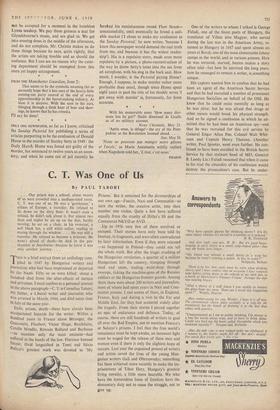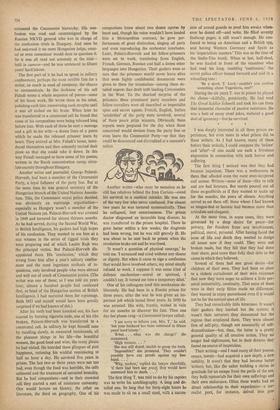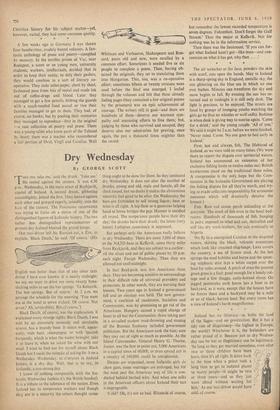C. T. Was One of Us
By PAUL
TABORI
. . . Our prison was a school; about twenty of 'us were crowded into a medium-sized room. C. T. was one of us. He was a 'gentleman,' a citizen of Europe, a traveller. He refused to lie down on the dirty floor. It wasn't even a refusal, he didn't talk about it. For almost two days and nights he sat up on the dais, hardly moving; he sat on a chair, in his overcoat, a soft black hat, a stiff white collar, reading or staring through the window. . . . He was still a traveller. He refused to become a prisoner. He wasn't afraid of death—he died in the gas- chamber at Auschwitz—because he knew it was only another journey. . . .
rr tits is a brief extract from an anthology com- piled in 1947 by Hungarian writers and Journalists who had been imprisoned or deported by the Nazis. Fifty or so were killed; about a hundred died from the after-effects of torture and privation. I must confess to a personal interest In the above paragraph—C. T. is Cornelius Tabori, my father, a Liberal writer and journalist who Was arrested in March, 1944, and died some time In July of the same year.
Exile, prison, death—these have always been occupational hazards for the writer. Within a hundred years in France alone Bdranger, the Goncourts, Flaubert, Victor Hugo, Baudelaire, Catulle Mendes, Romain Rolland and Barbusse to mention only the most eminent—had suffered at the hands of the law. Florence banned Dante; Ovid languished in Tomi and Silvio Pellico's greatest work was devoted to 'My Prisons.' But it remained for the dictatorships of our own age—Fascist, Nazi and Communist—to turn . the writer, the creative artist, into their number one victim. Quite a few have suffered equally from the cruelty of Hitler's SS and the Communist NKVD or AVO.
Up to 1956 very few of them survived or escaped. Their stories have only been told by hearsay, in fragments, and were often contradicted by later information. Even if they were released —as happened in Poland—they could not tell the whole truth. But after the tragic crushing of the Hungarian revolution,, a quarter of a million Hungarians left the country, tramping through mud and snow, wading waist-deep, through swamps, risking the machine-guns of the. Russian soldiers or the Hungarian frontier guards. Among them there were about 200 writers and journalists, most of whom had spent years in Nazi and Com- munist prisons. I met scores of them, in England, France, Italy and during a visit to the Far and Middle East, for they had scattered widely after the tragedy. From their stories I pieced together an epic of endurance and defiance. Today, of course, there are still hundreds of writers in gaol all over the Red Empire, not to mention Franco's or Salazar's prisons. I feel that the free world's conscience must be kept awake, an incessant fight must be waged for the release of these men and women even if there is only the slightest hope of success. Last year the organised protest of writers and artists saved the lives of the young Hun- garian writers Gali and Obersovszky; something has been achieved more recently to make the im- prisonment of Tibor Dery, Hungary's greatest living novelist, a little more bearable. We who have the tremendous boon of freedom have the elementary duty not to cease the struggle, not to give up. One of the writers to whom I talked is George Faludi, one of the finest poets of Hungary, the translator of Villon into Magyar, who served during the last war in the American Army, re- turned to Hungary in 1947 and spent almost six years at Recsk, one of the most abominable labour camps in the world, and in various prisons. How he was tortured, starved, beaten makes a story often told—but how he survived the long years, how he managed to remain a writer, is something unique.
His captors wanted him to confess that he had been an agent of the American Secret Service and that he had recruited a number of prominent Hungarian Socialists on behalf of the OSS. He knew that he could resist mentally as long as he was alive; but he was afraid that drugs or other means would break his physical strength. And so he signed a confession in which he ad- mitted that he had been an American spy—and that he was recruited for this evil service by General Edgar Allan Poe, Colonel Walt Whit- man and Captain Henry Thoreau. (Another writer, Paul Ignotus, went even further. He con- fessed to have been enrolled in the British Secret Service by that stalwart head of MI5, General B. Loody Lie.) Faludi reasoned that when it came to his trial the absurdity of his confession would destroy the prosecution's case. But he under- estimated the Communist hierarchy. His con- fession was read and countersigned by the Russian NKVD general who was in charge of the confession trials in Hungary. And once he, had endorsed it no mere Hungarian judge, coun- sel or even commissar would dare to question it. So it was all read out solemnly at the trial— held in camera—and he was sentenced to fifteen years' hard labour.
The first part of it he had to spend in solitary confinement, perhaps the most terrible fate for a writer, so much in need of company, the' chance to communicate. In the darkness of his cell Faludi wrote a whole sequence of poems—some of his finest work. He wrote them in his mind, polishing each line, memorising each strophe until it was all etched on his brain. When later he was transferred to a communal cell he found that some of his companions were being released long before him. With each of them he sent a message and a gift to his wife—a dozen lines of a poem which he made the released prisoner learn by heart. They arrived at Mrs. Faludi's home, intro- duced themselves and then solemnly recited their piece so that she could take it down. In this way Faludi managed to have some of his poems, written in the Recsk concentration camp, circu- late secretly throughout Hungary.
Another writer and journalist, George Paloczi- Horvath, had been a member of the Communist Party, a loyal follower of the party line. But at the same time he was general secretary of the Hungarian branch of the United Nations Associa- tion. This, the Communist secret police decided, was obviously an espionage organisation— especially as Hungary wasn't a member of the United Nations yet. Paloczi-Horvath was arrested in 1949 and tortured for almost thirteen months. As he had served, during the Second World War, in British Intelligence, his gaolers had high hopes of his confession. They wanted to use him as a star witness in the series of rigged trials they were preparing and of which Laszlo Rajk was the principal victim. But Paloczi-Horvath dis- appointed them. His 'confession,' which they wrung from him after a year's solitary confine- ment and the most ingenious methods of in- quisition, only involved people who were abroad and well out of reach of Communist justice. (The writer was one of these; as I was told six years later, almost a hundred people had confessed that, as head of the Hungarian section of British Intelligence, I had recruited them for espionage. Both MI5 and myself would have been greatly surprised if we had known of this.) After his teeth had been knocked out, his face scarred by burning cigarette ends, one of his ribs broken, Paloczi-Horvath was transferred to a communal cell. In solitary he kept himself sane by recalling slowly, in measured instalments, all the pleasant things in his life—the beautiful women, the good food and wine, the many places he had visited. He hoarded these glimpses of past happiness, rationing his wishful reminiscing to half an hour a day. He survived five years in prison. The last two or three years were not too bad, even though the food was horrible, the cells unheated and the treatment of unvaried brutality. But he had companions—and in their crowded cell they started a sort of miniature university. One would lecture on history, the other on literature, the third on geography. One of his companions knew about two dozen operas by heart and, though his voice wouldn't have landed him a Metropolitan contract, he gave per- formances of great distinction, singing all parts and even reproducing the orchestral interludes. Later, Paloczi-Horvath and his fellow-prisoners were set to work, translating from English, French, German, Russian and half a dozen other languages into Hungarian. Their gaolers were so sure that the prisoners would never leave alive that even highly confidential documents were given to them for translation—among them de- tailed reports that dealt with leading Communists in the West. To the shocked surprise of the prisoners these prominent party members and fellow-travellers were all described as imperialist spies and secret agents. French, English, Italian 'celebrities' of the party were involved, several of them peace prize winners. Obviously these reports were prepared for the day when those concerned would deviate from the party line or even leave the Communist Party—so that they could be denounced and discredited at a moment's notice.
Another writer—who must be nameless as he still has relatives behind the Iron Curtain—owed his survival to a medical mistake. He was one of the very few who never confessed. For almost two years he was tortured systematically. Then he collapsed, lost consciousness. The prison doctor diagnosed an incurable lung disease; he was transferred to the prison hospital. There he grew better within a few weeks; the diagnosis had been wrong, but he was still gravely ill. He was about to be sent back to prison when the revolution broke out and he was freed.
'It wasn't a question of physical courage,' he told me. '1 screamed and cried without any shame or dignity. But when it came to sign a confession that would have involved others, my mind simply refused to work. I suppose it was some kind of defence mechanism—moral or spiritual, I couldn't say. It turned me into a temporary idiot.'
One of his colleagues used this mechanism de- liberately. He had been in a Fascist prison for three years; after the war he was given an im- portant job which lasted three years. In 1950 he was arrested. His wife, frantic, waited in vain for six months to discover his fate. Then one day her phone rang—a Communist lawyer called : 'I am sorry to inform you, Mrs. T.,' he said, 'but your husband has been sentenced to fifteen years' hard labour.'
'B-but . . . what was the charge?' she stammered.
'High treason. . .
She was still dazed, unable to grasp the truth.
'Impossible!' she protested. 'They couldn't possibly have any proofs against my hus- band. . .
'Why, madam,' replied the lawyer cheerfully, 'if there had been any proof, they would have sentenced him to death. . .
The first thing T. was told to do by his captors was to write his autobiography. A long and de- tailed one. So long that for forty-eight hours he was made to sit on a small stool, with a succes- sion of armed guards to prod him awake when- ever he dozed off—and write. He filled seventy foolscap pages; it still wasn't enough. He con- fessed to being an American and a British spy, and having Western Germany and Spain as his 'imperialistic masters.' This was at the time of the Stalin-Tito break. When at last, half-dead, he was hauled in front of the examiner who had read his long, rambling 'confession,' the secret police officer leaned forward and said in a wheedling tone : 'Be a sport, T. Look—couldn't you confess something about Yugoslavia, too?'
During the six years T. was in prison he played the clown—skilfully, persistently. He had read The Good Soldier Schweik and took his cue from that immortal character of passive resistance. He was a butt of many cruel jokes, endured a good deal of ignominy—but he survived.
*
I was deeply interested in all these prison ex- periences; but even more in what prison did to these writers. As I had known many of them before their ordeals, I could compare the 'before' and 'after'—if one could use such a frivolous expression in connection with such horror and suffering.
The first thing I noticed was that they had become impatient. There was a restlessness in them that affected even the most even-tempered and serene. Writers—most of them—like to talk and are bad listeners. But words poured out of these ex-gaolbirds as if they wanted to make up for the months, the years of silence. Anything served to set them off; those whom I had known as tongue-tied or laconic had become more than articulate and eloquent.
At the same time, in some cases, they were governed by a deep desire for peace—for privacy, for freedom from any involvement, political, moral, personal. After having faced the issue of life and death they wanted to dodge all issues now if they could. They were not broken reeds, but they felt that they had done their share, paid more than fully their debt to the cause in which they believed.
Several of them had one great desire• —for children of their own. They had been so close to a violent curtailment of their own existence that now they were eager to achieve a little per- sonal immortality, continuity. That some of them were in their early fifties made no difference; they wanted to enjoy parenthood even if it would not be for the normal span of life.
They had remarkably little bitterness. It wasn't their gaolers they loathed but the system; it, wasn't their torturers they denounced but the regime that employed them. They were almost free of self-pity, though not necessarily of self- dramatisation—but, then, the latter is a pretty general quality of all creative artists. They no longer had nightmares, but in their dreams they found no source of inspiration.
Their writing—and I read many of their poems, essays, novels—had acquired a new depth, a neW nobility. It wasn't that they had become better writers; but, like the sailor building a shrine in gratitude for an escape from the perils of the sea, they built memorials for their own sufferings and their own endurance. Often these works had no direct relationship to their experiences—a sur- realist poet, for instance, delved into pre- Christian history for his subject matter—yet, however, varied, they had some common quality.
A few weeks ago in Germany I was shown four handwritten, crudely bound volumes. A fan- tastic anthology of prose and poetry—compiled by memory. In the terrible prison of Vac, near Budapest, a score or so young men, university students, workers, intellectuals, decided that in order to keep their sanity, to defy their gaolers, they would combine in a sort of literary co- operative. They stole toilet-paper, sheet by sheet, fashioned pens from bits of metal and made ink out of coffee-dregs and blood. Later they managed to get a few pencils, bribing the guards with a much-needed food parcel or two their families managed to get to them. They had, of course, no books; but by pooling their memories they managed to reproduce—first in the original —a vast collection of poetry and prose. There was a young rabbi who knew parts of the Talmud by heart; there was a teacher who remembered a fair portion of Ovid, Virgil and Ca tullus. Walt Whitman and Verhaeren, Shakespeare and Ron- sard, poets old and new, were recalled by a common effort. Sometimes it needed five or six people to complete a poem. Then, having ob- tained the originals, they set to translating them into Hungarian. This, too, was a co-operative effort; sometimes fifteen or twenty versions were used before the final one emerged. I leafed through the volumes and felt that these already fading pages (they contained a few original poems by the prisoners) was an epic achievement of courage. The writers still in gaol—and there are hundreds of them—deserve our warmest sym- pathy and unceasing efforts to free them; but, judging by those who survived and escaped, they deserve also our admiration for proving, once again, the pen a thousand times mightier than the sword.












































 Previous page
Previous page